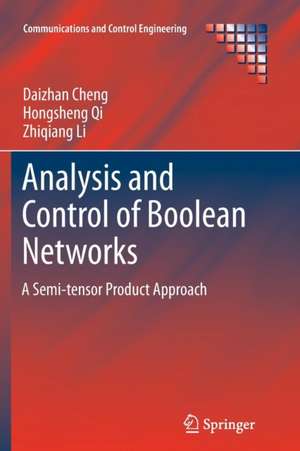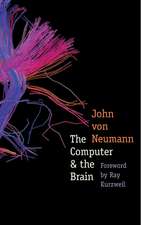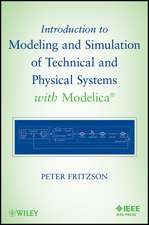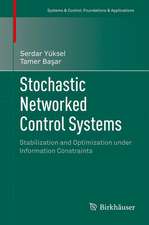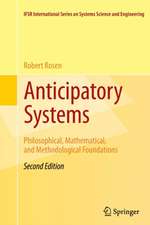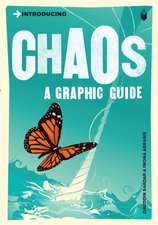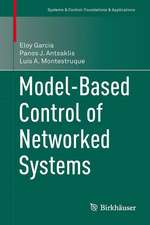Analysis and Control of Boolean Networks: A Semi-tensor Product Approach: Communications and Control Engineering
Autor Daizhan Cheng, Hongsheng Qi, Zhiqiang Lien Limba Engleză Paperback – 27 ian 2013
| Toate formatele și edițiile | Preț | Express |
|---|---|---|
| Paperback (1) | 649.71 lei 6-8 săpt. | |
| SPRINGER LONDON – 27 ian 2013 | 649.71 lei 6-8 săpt. | |
| Hardback (1) | 656.25 lei 6-8 săpt. | |
| SPRINGER LONDON – 2 dec 2010 | 656.25 lei 6-8 săpt. |
Din seria Communications and Control Engineering
- 15%
 Preț: 659.70 lei
Preț: 659.70 lei - 20%
 Preț: 879.71 lei
Preț: 879.71 lei - 18%
 Preț: 953.65 lei
Preț: 953.65 lei - 18%
 Preț: 1117.03 lei
Preț: 1117.03 lei - 9%
 Preț: 1385.74 lei
Preț: 1385.74 lei - 18%
 Preț: 1128.08 lei
Preț: 1128.08 lei - 18%
 Preț: 953.65 lei
Preț: 953.65 lei - 15%
 Preț: 656.89 lei
Preț: 656.89 lei - 18%
 Preț: 896.52 lei
Preț: 896.52 lei - 18%
 Preț: 1113.26 lei
Preț: 1113.26 lei - 18%
 Preț: 1388.22 lei
Preț: 1388.22 lei - 15%
 Preț: 647.27 lei
Preț: 647.27 lei - 18%
 Preț: 954.45 lei
Preț: 954.45 lei - 18%
 Preț: 1231.47 lei
Preț: 1231.47 lei - 18%
 Preț: 948.92 lei
Preț: 948.92 lei - 18%
 Preț: 1232.57 lei
Preț: 1232.57 lei - 18%
 Preț: 1127.28 lei
Preț: 1127.28 lei - 15%
 Preț: 643.34 lei
Preț: 643.34 lei - 18%
 Preț: 1401.30 lei
Preț: 1401.30 lei - 15%
 Preț: 651.51 lei
Preț: 651.51 lei - 20%
 Preț: 1454.07 lei
Preț: 1454.07 lei - 18%
 Preț: 948.79 lei
Preț: 948.79 lei - 18%
 Preț: 1233.06 lei
Preț: 1233.06 lei - 18%
 Preț: 947.85 lei
Preț: 947.85 lei - 18%
 Preț: 950.96 lei
Preț: 950.96 lei - 18%
 Preț: 956.99 lei
Preț: 956.99 lei - 15%
 Preț: 644.18 lei
Preț: 644.18 lei - 18%
 Preț: 946.87 lei
Preț: 946.87 lei - 18%
 Preț: 951.14 lei
Preț: 951.14 lei - 18%
 Preț: 961.55 lei
Preț: 961.55 lei - 15%
 Preț: 644.18 lei
Preț: 644.18 lei - 20%
 Preț: 990.80 lei
Preț: 990.80 lei - 18%
 Preț: 1006.72 lei
Preț: 1006.72 lei - 18%
 Preț: 942.44 lei
Preț: 942.44 lei - 18%
 Preț: 1233.06 lei
Preț: 1233.06 lei - 15%
 Preț: 641.85 lei
Preț: 641.85 lei - 18%
 Preț: 957.75 lei
Preț: 957.75 lei - 15%
 Preț: 649.87 lei
Preț: 649.87 lei - 18%
 Preț: 958.07 lei
Preț: 958.07 lei - 18%
 Preț: 1117.99 lei
Preț: 1117.99 lei - 18%
 Preț: 1395.94 lei
Preț: 1395.94 lei - 18%
 Preț: 781.62 lei
Preț: 781.62 lei - 18%
 Preț: 953.20 lei
Preț: 953.20 lei - 18%
 Preț: 1109.78 lei
Preț: 1109.78 lei
Preț: 649.71 lei
Preț vechi: 764.37 lei
-15% Nou
Puncte Express: 975
Preț estimativ în valută:
124.33€ • 130.24$ • 103.04£
124.33€ • 130.24$ • 103.04£
Carte tipărită la comandă
Livrare economică 08-22 aprilie
Preluare comenzi: 021 569.72.76
Specificații
ISBN-13: 9781447126119
ISBN-10: 1447126114
Pagini: 488
Ilustrații: XVI, 472 p.
Dimensiuni: 155 x 235 x 26 mm
Greutate: 0.68 kg
Ediția:2011
Editura: SPRINGER LONDON
Colecția Springer
Seria Communications and Control Engineering
Locul publicării:London, United Kingdom
ISBN-10: 1447126114
Pagini: 488
Ilustrații: XVI, 472 p.
Dimensiuni: 155 x 235 x 26 mm
Greutate: 0.68 kg
Ediția:2011
Editura: SPRINGER LONDON
Colecția Springer
Seria Communications and Control Engineering
Locul publicării:London, United Kingdom
Public țintă
GraduateCuprins
Propositional Logic.- Semi-tensor Product of Matrices.- Matrix Expression of Logic.- Logical Equation.- Topological Structure of Boolean Networks.- Input-state Approach of Boolean Control Networks.- Controllability and Observability of BCN.- Realization of BCN.- Stability and Stabilization.- Disturbance Decoupling.- k-valued Network.- Input–Output Decomposition.- Random Boolean Network.- Appendix: Numerical Algorithms.
Recenzii
From the reviews:
“The aim of the book is to provide a new framework for the study of Boolean control networks. … The book is self-contained and contains many examples which illustrate the concepts and the proposed techniques. … the book represents a fundamental reference for researchers in systems biology, systems science and physics.” (Valeriu Prepeliţă, Zentralblatt MATH, Vol. 1209, 2011)
“The aim of the book is to provide a new framework for the study of Boolean control networks. … The book is self-contained and contains many examples which illustrate the concepts and the proposed techniques. … the book represents a fundamental reference for researchers in systems biology, systems science and physics.” (Valeriu Prepeliţă, Zentralblatt MATH, Vol. 1209, 2011)
Notă biografică
Daizhan Cheng received the Ph.D. degree in systems science from Washington University, St. Louis, in 1985. Currently, he is a Professor with the Institute of Systems Science, Chinese Academy of Sciences, Beijing, China. His research interests include nonlinear systems, numerical method, complex systems, etc. Dr. Cheng is Chairman of the Technical Committee on Control Theory (since 2003), Chinese Association of Automation, a Fellow of the IEEE, and a Fellow of the International Federation of Automatic Control. Hongsheng Qi received the Ph.D. degree in systems theory from the Academy of Mathematics and Systems Science, Chinese Academy of Sciences in 2008. He is currently a post-doctoral fellow at the Key Laboratory of Systems and Control, Chinese Academy of Sciences. His research interests include nonlinear systems control, complex systems, etc. Zhiqiang Li received the M.S. degree from Zhengzhou University in 2007. He is currently a Ph.D. student in the Academy of Mathematics and Systems Science, Chinese Academy of Sciences. His research interests include nonlinear systems control, complex systems, etc.
Textul de pe ultima copertă
The Boolean network has become a powerful tool for describing and simulating cellular networks in which the elements behave in an on–off fashion. Analysis and Control of Boolean Networks presents a systematic new approach to the investigation of Boolean control networks. The fundamental tool in this approach is a novel matrix product called the semi-tensor product (STP). Using the STP, a logical function can be expressed as a conventional discrete-time linear system. In the light of this linear expression, certain major issues concerning Boolean network topology – fixed points, cycles, transient times and basins of attractors – can be easily revealed by a set of formulae. This framework renders the state-space approach to dynamic control systems applicable to Boolean control networks. The bilinear-systemic representation of a Boolean control network makes it possible to investigate basic control problems including controllability, observability, stabilization, disturbance decoupling, identification, optimal control, etc.
The book is self-contained, requiring only knowledge of linear algebra and the basics of the control theory of linear systems. It begins with a short introduction to prepositional logic and the concepts and properties of the STP and progressing via the (bi)linear expression of Boolean (control) networks to disturbance decoupling and decomposition of Boolean control systems. Finally multi-valued logic is considered as a more precise way of describing real networks and stochastic Boolean networks are touched upon. Relevant numerical calculations are explained in an appendix and a MATLAB® toolbox for the algorithms in the book can be downloaded from http://lsc.amss.ac.cn/~dcheng/.
Analysis and Control of Boolean Networks will be a fundamental reference for researchers in systems biology, control, systems science and physics. The book was developed for a short course for graduatestudents and is suitable for that purpose. Computer scientists and logicians may also find this book to be of interest.
The book is self-contained, requiring only knowledge of linear algebra and the basics of the control theory of linear systems. It begins with a short introduction to prepositional logic and the concepts and properties of the STP and progressing via the (bi)linear expression of Boolean (control) networks to disturbance decoupling and decomposition of Boolean control systems. Finally multi-valued logic is considered as a more precise way of describing real networks and stochastic Boolean networks are touched upon. Relevant numerical calculations are explained in an appendix and a MATLAB® toolbox for the algorithms in the book can be downloaded from http://lsc.amss.ac.cn/~dcheng/.
Analysis and Control of Boolean Networks will be a fundamental reference for researchers in systems biology, control, systems science and physics. The book was developed for a short course for graduatestudents and is suitable for that purpose. Computer scientists and logicians may also find this book to be of interest.
Caracteristici
Shows the reader methods of dealing with biologically-derived networks mathematically using well-known and proven techniques MATLAB® toolbox allows the reader to simulate the results of algorithms easily Demonstrates how logical functions can be translated into matrices for arithmetic treatment. Includes supplementary material: sn.pub/extras
